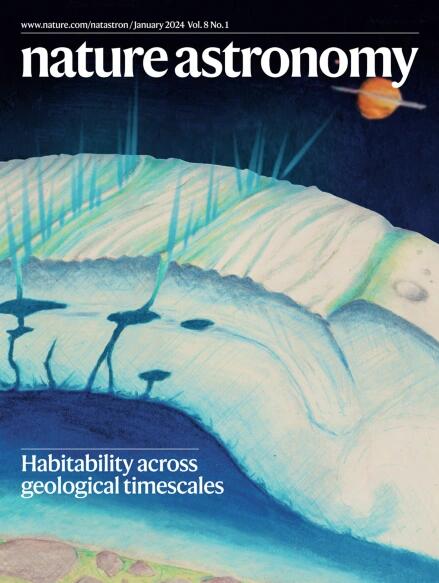太阳上重新连接的磁场线的超阿尔弗涅滑动观测
IF 12.9
1区 物理与天体物理
Q1 ASTRONOMY & ASTROPHYSICS
引用次数: 0
摘要
磁场线的滑动运动是三维磁重联的一个明显特征,是驱动太阳和恒星耀斑的一个基本过程。虽然这是数值实验的一个关键预测,但在以前的观测中,由 "滑移运行 "再连接驱动的快速超阿尔弗韦尼磁场线滑移仍然难以捉摸。最近设计的界面区域成像光谱仪(IRIS)高节奏观测计划为探索瞬态耀斑现象开辟了新的领域。通过利用 IRIS 的高时间分辨率图像(约 2 秒),我们在这里揭示了耀斑内核以每秒数千公里的速度发生的滑动运动。耀斑内核的快速运动直接证明了准分离矩阵层中的滑动再连接,在这些区域中,磁场会强烈改变其连接性。我们的研究结果为近二十年来一直未得到解决的理论预测提供了观测证据,并扩大了可能发生再连接相关现象的磁场配置范围。本文章由计算机程序翻译,如有差异,请以英文原文为准。


Observation of super-Alfvénic slippage of reconnecting magnetic field lines on the Sun
Slipping motions of magnetic field lines are a distinct signature of three-dimensional magnetic reconnection, a fundamental process driving solar and stellar flares. While being a key prediction of numerical experiments, the rapid super-Alfvénic field line slippage driven by the ‘slip-running’ reconnection has remained elusive in previous observations. New frontiers into exploring transient flare phenomena were introduced by recently designed high cadence observing programs of the Interface Region Imaging Spectrograph (IRIS). By exploiting high temporal resolution imagery (~2 s) of IRIS, here we reveal slipping motions of flare kernels at speeds reaching thousands of kilometres per second. The fast kernel motions are direct evidence of slip-running reconnection in quasi-separatrix layers, regions where magnetic field strongly changes its connectivity. Our results provide observational proof of theoretical predictions unaddressed for nearly two decades and extend the range of magnetic field configurations where reconnection-related phenomena can occur. High-resolution solar flare observations captured rapid brightening in the Sun’s lower atmosphere. Their speeds of thousands of kilometres per second provide a missing piece of evidence for magnetic reconnection in three dimensions.
求助全文
通过发布文献求助,成功后即可免费获取论文全文。
去求助
来源期刊

Nature Astronomy
Physics and Astronomy-Astronomy and Astrophysics
CiteScore
19.50
自引率
2.80%
发文量
252
期刊介绍:
Nature Astronomy, the oldest science, has played a significant role in the history of Nature. Throughout the years, pioneering discoveries such as the first quasar, exoplanet, and understanding of spiral nebulae have been reported in the journal. With the introduction of Nature Astronomy, the field now receives expanded coverage, welcoming research in astronomy, astrophysics, and planetary science. The primary objective is to encourage closer collaboration among researchers in these related areas.
Similar to other journals under the Nature brand, Nature Astronomy boasts a devoted team of professional editors, ensuring fairness and rigorous peer-review processes. The journal maintains high standards in copy-editing and production, ensuring timely publication and editorial independence.
In addition to original research, Nature Astronomy publishes a wide range of content, including Comments, Reviews, News and Views, Features, and Correspondence. This diverse collection covers various disciplines within astronomy and includes contributions from a diverse range of voices.
 求助内容:
求助内容: 应助结果提醒方式:
应助结果提醒方式:


